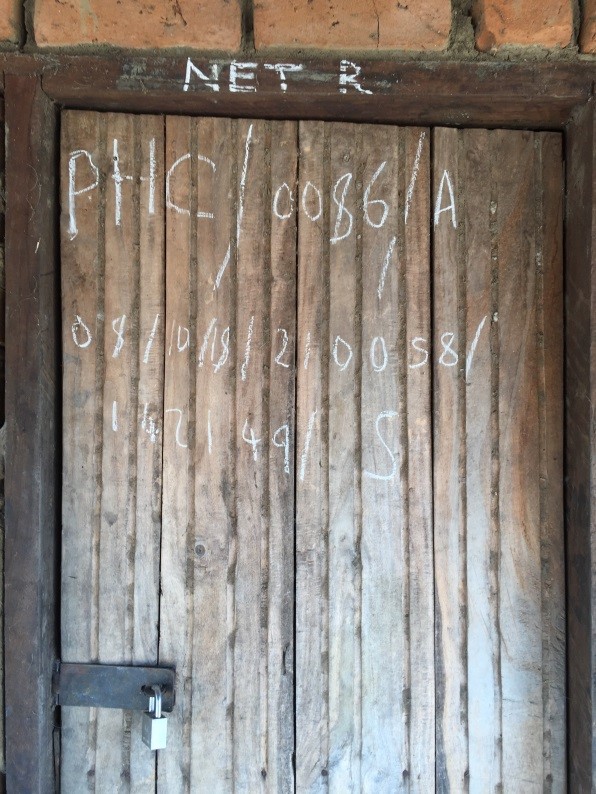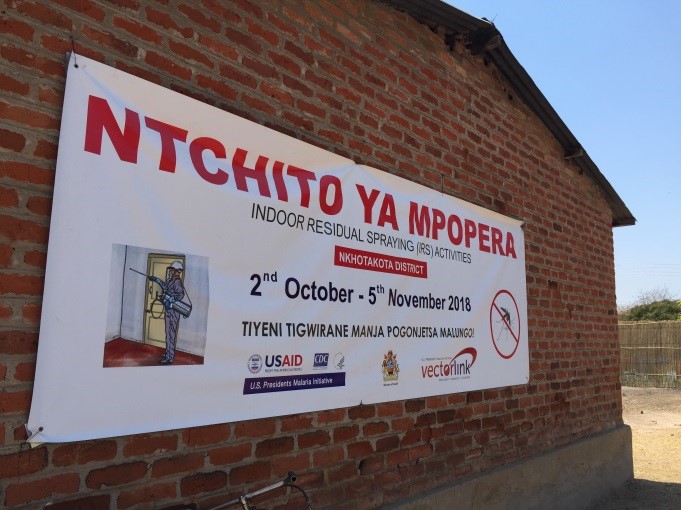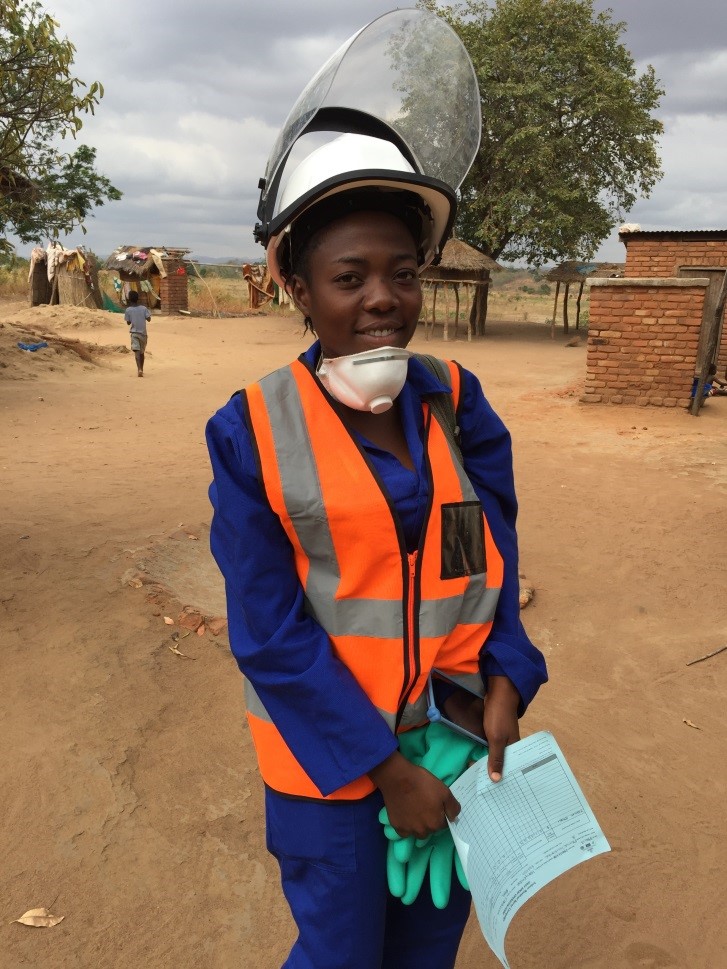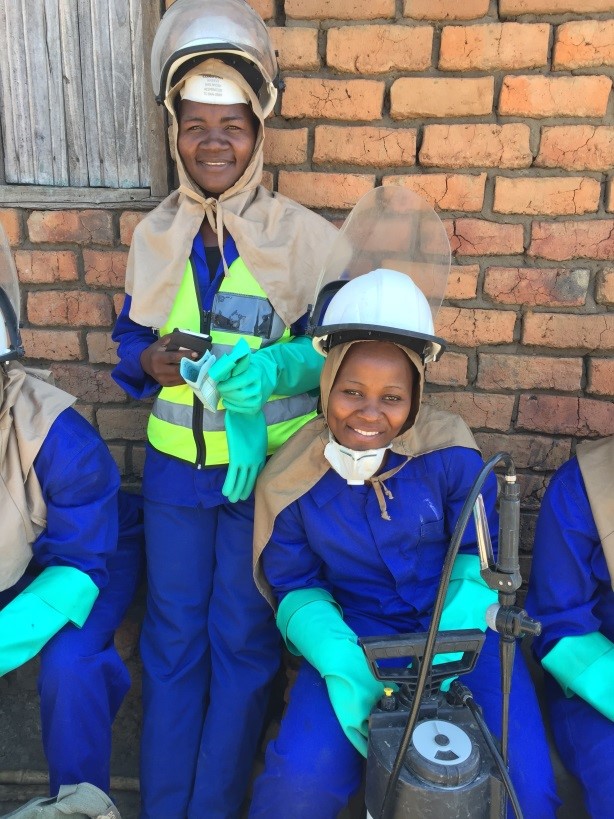October is a busy month in Malawi. The national census is wrapping up, voters are registering for the 2019 national elections, insecticide-treated mosquito nets (ITNs) are being distributed via a mass campaign and indoor residual spraying (IRS) is underway in Nkhotakota District. The doors of houses in the district are covered with chalk marks indicating household registration for these activities.
The U.S. President’s Malaria Initiative (PMI) previously supported IRS in Malawi but ceased spraying six years ago for a number of reasons, including pyrethroid resistance and the lack of an affordable, long-lasting effective insecticide. Now, PMI/Malawi is able to procure Actellic 300CS, a longer-lasting insecticide at a lower price thanks to the UNITAID-funded Next Generation Indoor Residual Spraying Project (NGenIRS).
The government of Malawi and residents are glad that PMI has resumed its support. As National Malaria Control Program Deputy Manager Shadreck Mulenga notes, “We are very excited now that PMI has finally resumed its support for implementation of IRS in the district. We strongly believe that with this kind of partnerships we should be able to control and eventually eliminate malaria in the country.”
Nkhotakota District is in the Central Region of Malawi, on the west coast of Lake Malawi, with a population of more than 400,000 people. Malaria is the leading cause of morbidity and mortality in Nkhotakota, and the proportion of malaria cases of all outpatient department visits has increased significantly in the past four years. According to District Health Information System 2 (DHIS2) data, the prevalence increased from 32 percent in 2014–2015, to 48.5 percent in 2015–2016, to 51.7 percent in 2016–2017.
While PMI and other partners are supporting a number of strategies to fight malaria, including provision of ITNs, case management, and intermittent preventive treatment of pregnant women, it has become evident that an additional tool is needed to reduce the malaria burden. Thus, PMI is supporting an IRS campaign that aims to cover 118,000 eligible structures, protecting an estimated 480,362 people.
The government of Malawi has been advocating for IRS for years, and during this spray campaign, the National Malaria Control Program (NMCP) and district health teams are proving to be eager and active partners in implementation. They’ve participated in trainings on coordination, implementation, and supervision of IRS activities and served as master trainers on spray technique. The NMCP is also working with the environmental affairs department to ensure environmental compliance through inspections before, during and after spraying. Health surveillance assistants and other cadres are performing information, education and communication, sensitization, and mobilization activities to raise awareness and encourage acceptance of IRS.
Another distinguishing feature of the campaign has been the strong participation of women. This year— thanks to deliberate efforts to integrate gender equality and female empowerment into IRS planning and implementation, as well as changing gender norms in Malawi—women make up approximately 40 percent of personnel hired for the campaign and are serving as supervisors, team leaders, M&E specialists, spray operators and washers.
“I’m proud of my job,” said Tembo. “Not only am I helping to protect people in this area from malaria, but I am able to work and earn money.”
Lydia Tembo, age 21, is one of the supervisors. She greatly appreciates the work and enjoys leading her team. With her respectful yet determined demeanor, she is able to help convince homeowners to remove all their belongings from their houses prior to spraying (some people are reluctant to do so). She also carefully reviews reporting cards with the spray operators after they have finished spraying to ensure that the forms are accurate.
The current campaign is scheduled to run until early November. PMI has conducted cone bioassay tests to ensure quality of spraying (i.e., that the insecticide is being applied evenly and completely to the walls in the proper dosage), and will continue to conduct monthly bioassay tests in a sampling of houses to measure how long the insecticide is lasting on the walls of houses in Malawi. The intent is that residual effectiveness will continue to protect residents throughout the peak transmission season.
PMI and the NMCP will monitor the DHIS2 data and expect to see the number of malaria cases in Nkhotakota decline as a result of this important life-saving intervention.




